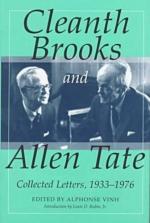|
This section contains 2,075 words (approx. 7 pages at 300 words per page) |

|
Tate has always been less a technical literary critic than an essayist using literature as the frame of reference within which he criticizes the mind and life of his time in the light of his convictions about the proper ends of man. He speaks as a twentieth-century humanist intellectual, isolated and virtually unheard in the barbaric society whose larger deformities it is his concern to examine and minister to. (p. 108)
[We must see him as the man of letters], as flanked dangerously by two opposed chimeras of certainty, two opposed forces of the chaotic modern world [positivism and romanticism] that he perceives and must try to survive in. The first of them … Tate has unmistakably kept clear of. But the second has sometimes been harder for him to recognize. (p. 112)
Tate has continually declared his mistrust of quasi-religions of art, especially that of Matthew Arnold, whom he apparently...
|
This section contains 2,075 words (approx. 7 pages at 300 words per page) |

|


